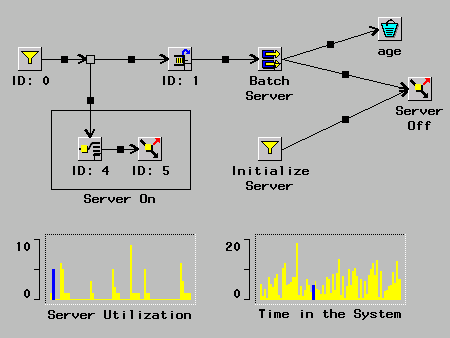| Selected Examples |
Batch Service I
Suppose that you want to service transactions in
a batch where you start service simultaneously
on all the items in the batch but the individual service
times are independent and identically distributed.
This might occur in a drying process,
where you have arrivals to a drying machine determined
by some arrival process.
When there are enough items to fill the batch,
the baking of all the items in the batch begins.
However, as each item dries it is removed individually
from the drying machine.

|
Figure 10.16: Batch Service
The model in Figure 10.16 accomplishes this batch service.
In this model the multiple-server is set to the batch
size and the Server On compound component turns the
server on if it is empty and there are 10 or more transactions
in the FIFOQueue.
The Trigger
labeled "Server Off" turns the server
off when each transaction leaves service.
When a server is off, all transactions currently in
service complete normally, but the server will not
send out messages for additional transactions.
As a result, service on all transactions in process will complete,
but additional arrivals to the system will queue until there
are at least 10 and the server is empty.
Notice the LinePlot labeled "Server Utilization." It shows the number of transactions in service over time. It demonstrates graphically the batch service and independent nature of the service completions.
Copyright © 2008 by SAS Institute Inc., Cary, NC, USA. All rights reserved.